Editor:
Julia Evergreen Keefer, Ph.D
Web Designers and Consultant
Richard Malenitza
Assistants
Sherida Davis-Bryan
Danielle Ramos
 |
|
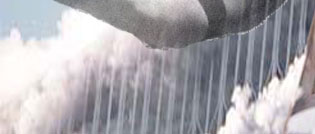 |
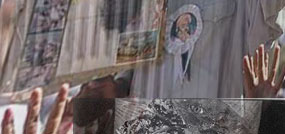 |
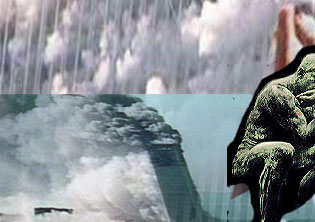 |
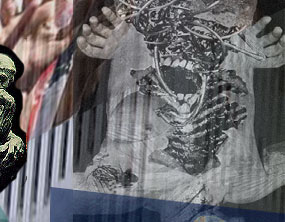 |
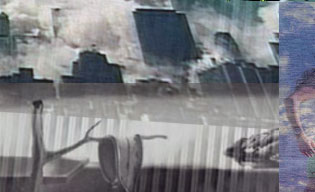 |
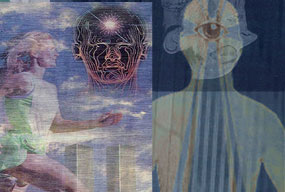 |
 |
|
The
Online Journal of Education, Media,
and Health: Issue on Terrorism
and Un-clashing Civilizations
This issue on Terrorism is inspired by the events of 9/11, to combine
academic inquiry and discourse with journalism, personal testimony, poetry
and artwork. In addition to previously stated goals,
(see archived edition), this edition of OJEMH 1) encourages the development
and exchange of an international group of professors and students to cross
national boundaries in the discussion of terrorism; 2) incorporates current
events and media analyses into multidisciplinary/multigenre curricula
to help students deal with crises and catastrophes, 3) weaves personal
testimony, essay, memoir, poetry around academic writing not only as a
catharsis, but as a way to validate self in the midst of dangerous mass
movements.
The name of the journal has been changed from The Journal of Online Education (1998) to The Online Journal of Education, Media and Health in order to reflect its true cross disciplinary focus. The focal point of controversy of this edition is terrorism -- its causes, methods, goals and objectives, propaganda, coping, and then rebuilding and preventing future attacks. It includes all clashes and conflicts, whether you want to focus on the attacks on or by America, or the struggles between Israel and Palestine, India and Pakistan, the Philippines and their internal outlaws or any other place in the world, through historical or current studies.
The Table of Contents is in a "fluid state," as is the war
on terror, and you can submit at any time. Don't expect to see standard
web design or a consistent interface with this Journal.With all the online
education platforms such as Prometheus, Blackboard etc. there is a tendency
to package education into information boxes. As we struggle to make technology
"user friendly," we risk dumbing down our complex heritage of knowledge
into tight little info templates. If online education in 2002 is an effort
to create an objective body of knowledge that can be accessed by anyone
anywhere anytim,e this Journal is a deliberate attempt to mess up the
box.The internet is an excellent medium for the uncensored exchange of
opinions, multimedia expression, and information, hopefully knowledge,
from around the world. Because terrorism by its nature paralyses and locks
down its victims, the internet can be used as a medium to open up channels
of communication and to mitigate the impotency caused by terrorism's stultifying
blows. In this editorial, I will describe my approach to education and
terrorism in contrast to two other approaches: 1) to use education as
indoctrination or propaganda for terrorism, counter-terrorism or nationalism
and/or 2) to avoid all responses to current events and adhere to the tried
and true curricula at all costs.
As a senior WAOE officer and founder of the Journal of Online Education,
I have always sought for a way to create some kind of global community
that was not just economic, such as McWorld, or diplomatic and humanitarian
such as the United Nations. The university plays an important role in
times of crisis, not only to explore the events in as many ways as possible
but to offer an antidote to the mainstream media, often censored for national
security. When we first began using the internet as a teaching tool in
1995, I talked of the need of a multi-disciplinary, multi-genre approach,
a need to incorporate cyber rhetoric with traditional rhetoric, a fresh
approach to semiotics, a need to change the academic paper so it could
be easily read online. Now I have tried to incorporate current events,
in this case, catastrophes, with the traditional academic curriculum so
the university becomes a place for more immediate understanding of trauma
reflected in tranquillity or-- anguish. In this fast paced manic world
we don't have the luxury of always reflecting upon trauma in retrospect.
With nuclear and biological weapons, a holocaust could come any time.
We need to train students to think quickly, comprehensively, critically
and creatively, to combine personal, academic, argumentative, scholarly
writing. As long as there is humility and cognitive flexibility, it is
okay to take chances, to develop wild hypotheses as long as we are willing
to prove them wrong. I want speed WITH accuracy, depth, comprehension
and creativity. Just as athlete can be quick as well as strong, balanced
and accurate, particularly in martial arts, there is no reason we can't
train students to do this intellectually. How Can Education be Responsive,
Integrative, Critical, Creative, Cathartic, and Compassionate in the Midst
of Terrorism?
On September 11, 2001 when the phones were down and the television stations kept replaying the destruction of the Twin Towers in Manhattan, the only communication possible with the world was through the internet. I received a message from my brother in Missouri about the World Trade Center attacks before I actually saw and smelled the smoke blowing north. If the media theorist Marshall McLuhan called radio hot and TV cool, I would say that the internet moves from freezing (all those frozen websites preserved in pixel immortality) to boiling, as in flame wars and hot new websites. However the medium is always fluid; cyberspace lacks the finality and closure of books, newspapers and magazines, and thank God, it cannot burn literally. It bubbles and boils but does not burn. Ironically, the Al Qaeda terrorists used the internet to communicate with each other, logging on at Kinko's, reading and writing the coded messages, and then disappearing without a trace, as anonymous as most internet users. Because of the dialectical nature of human intercourse, anything that can be used for a good purpose can also be abused for a bad one. We are here to discuss all these uses.
The attacks of September 11 were not the worst nor the last acts of terrorism. Israel insists that it has suffered more, and Palestinians say that the Israeli occupation is perpetual terror. 3000 victims pale in comparison to the 90 million killed in twentieth century wars. The fires of Hiroshima were hotter--5,400 F. and the aftereffects were far worse than the WTC cough and asbestos contamination. Innocent civilians in the Middle East have faced a far more perennial threat of terrorism than New Yorkers. But these attacks were visually dramatic, about as dramatic an image that could be captured in one shot through a camera lens. These events revealed a vulnerability in American hegemony previously undetected and the melting icons of wealth and power symbolized something, bad or good, to everyone in the world. After a suicide/homicide attack, Israeli medics and cleaners erase the damage as fast as possible, trying to destroy its memory, while New Yorkers are still arguing about how Ground Zero should be remembered. By connecting education with terrorism, we choose to remember, but remember creatively and cathartically, so that we are empowered rather than quagmired in the tragedy.
As a New York University professor teaching near Ground Zero, I was confronted with the challenge of teaching courses in rhetoric, global literature and media/communication to students rendered homeless, jobless, and traumatized by the terrorist attacks. Ultimately I was struggling with the questions: How can education be responsive, integrative, critical, creative, and cathartic in the midst of terror? This is ultimately a Western point of view, stressing as it does liberty, expression and even dissension. It is not always the best way to train soldiers who must eliminate layers of complexity and ambiguity in order to engage in the binary, us-versus-them art of war. It is not what basic Islamic education stresses in the madrasas where students learn classical Arabic, memorize the Koran, and then recite it five times a day. In the better universities in Saudi Arabia, Iran and Egypt this religious devotion is combined successfully with training in science and technology, but the Western tradition of dialectical discourse in the humanities encouraging freedom of thought and expression is not always adopted. The more significant players of terrorist groups train in the best western schools but usually just for science, technology and/or business. Ironically, the Aghan training camps are responsive, integrative, creative, and cathartic from their point of view which is why so many talented, educated young men love to go there to fight the jihad, learn biochemical secrets, camp out and climb mountains, engage in role playing and terrorist skits and analyse the evils of America from their point of view. Still the goals of these camps were to create true believers not critical thinkers--romantic jihadhis who did not envision the ugliness, betrayal and pain of actions that would lead them to hell in a prison camp instead of that paradise where Allah waits for them with ruby crowns, honey, melon, grapes and 72 black-eyed virgins. The western world also harbors its share of true believers and some of my students from the Middle East felt that because of their homogenized media and education, Americans are the truest believers of them all. What can we, as educators, do about this?
I am advocating that when confronted with terrorism or a similar disaster, education should be responsive, integrative, critical, creative, cathartic and compassionate. One could argue that all education should be like this but I am talking about being directly responsive to the catastrophe, not ignoring it, as many professors did. There is a time and place to ignore reality: I never changed the curricula of my screenwriting classes because the students voted to continue with their stories. However, in rhetoric, media studies and global literature we were directly responsive to current events, which gave students a perspective on the horror that they would not otherwise have had.
I.RESPONSIVE
When the hijacked planes slammed into the WTC on September 11, I was
in Starbucks, one of McWorld's castles. I had not seen the news that morning,
because before 9/11 I was so disgusted by the triviality of American network
programming, I never turned it on.(Now I watch Digital TV in French and
Arabic.) Anyway, when I began to pay for my coffee, the server said "It's
free." What? Free coffee at Starbucks? The world must be coming to
an end. He explained: "We have been attacked. We are at war. Enjoy
it, and the free muffin too. It may be your last. We are closing now."
Manhattan was surprisingly quiet as everyone scurried to the stores to
buy supplies. The nearest store was the gourmet grocery store Agata and
Valentina's, hardly the place to buy cans for war rations. Nevertheless,
I bought cold cuts, fruits and veggies, reasoning that turning on the
stove would only add to the fire. If I were one of the few survivors,
my cats and I could probably live on cat food for quite a while. It never
occurred to me to buy water, the most important staple. There was no hysteria,
just long lines and hushed voices. New York had not yet turned into that
kind, gentle place that the world saw the next day.
I heard fractured stories about the huge fires downtown, the refugees
running uptown, the collapse of the towers. And then-- yes, the Pentagon
was hit as well but the details weren't clear. The feeling was that the
UN was next, in which case we would all be dead or half dead, which was
worse. I stood in line, embraced by a bitter fatalism, that my life should
end shopping by myself in a city that had long ago swallowed me up in
its frantic energy.
I spent the rest of the day in front of the TV like the rest of the world,
watching the spectacular visual replays of the most dramatically devastating
act of terrrorism we had ever seen. Although people said we did not know
for sure who was at the root of this, it was all too clear to me: it was
the triumph of the suicidal jihadis over the McWorld they hated.
Because teaching in University barely pays the rent, I also work as a
health professional doing exercise therapy, massage, and postural retraining.
On Tuesday night I received calls from many investment analysts and stockbrokers
who had spent the day running out of ground zero. While they weren't injured
enough to go to the hospital, they suffered from torn muscles, aching
joints and damaged psyches. I spent the following weeks walking around
Manhattan-- there was no public transportation to speak of-- doing house
calls for all these downtown workers. Then the next day I had to risk
the Lincoln Tunnel to go upstate to SUNY New Paltz to teach. On the weekend
I had to brave the fumes from ground zero to teach at NYU.
The existentialists said there is nothing like committed action to mitigate
fear, and it's true. However, I was worried about my NYU students. I had
lost half of the classes, not to any deaths that I was aware of, but to
withdrawals because 9/11 left so many homeless, jobless, and severely
traumatized. I also teach aerobics at the gym and I will never forget
what Coles Recreation Center looked like the week after the attacks:
As I entered, there were Salvation Army boxes of clothes lacing the rim
of the Olympic swimming pool. On the left was a huge box of condoms and
dental dams, which seemed strange until I ventured further into this cavernous
building usually consecrated to the development of youthful bodies through
sports and exercise. One of the exercise rooms was converted into a crying
room where students talked to their Moms on old fashioned phones. Then
worst of all-- the entire bastketball gym looked like army barracks with
over a hundred cots side by side. No privacy, No sleep, No exit.
I did not teach kickboxing that day.
However, ten days later, when some sense of humor had been restored, students
were only willing to metaphorically kick Osama bin Laden to death!
In some ways I disagree with McLuhan when he said the medium is always
the message because after 9/11, especially during the first commercial-free
week, I was inspired and impressed by the programming, by the coverage
of the events, the questions, the aesthetics, the sensitivity, even the
historical perspectives. I thought TV has once again fulfilled its early
promise of being a great national and international unifier. Then the
commercials came back, shorter more superficial coverage, censored events.
We no longer saw the rhetoric of the other side, as bin Laden's tapes
had been deemed inappropriate for Western broadcast. A month later, the
usual trivia reemerged and TV once more became a playground where we could
amuse ourselves to death.
Responsiveness is dependent on sensitivity and speed. Since NYU is so
close to the WTC, one would have to be deaf, dumb and in chains to avoid
a response. Even with those senses deprived, the pervasive odor of human
carrion, smoke, and toxic fumes would still send the body into high alert.
The event itself was over in less than a day but the fires burned for
the next five months and the visual images of planes crashing and buildings
collapsing replayed over and over again on television.
The American media chose to depict 9/11 and its aftermath with the one
note purity of a tragedy, avoiding everyday clutter, ambiguity and mundanity.They
even cancelled the clutter of commercials for a week to keep their genre
pure. The following photos show the clutter when we actually walked through
the area. On television Ground Zero was immortalized with pristine images
of tragedy. Yet in actuality it was an untidy mess of damaged McWorld,
tattered memorials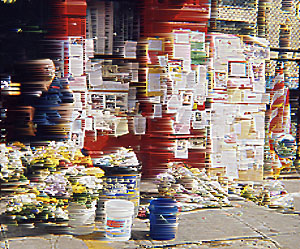 and
deserted streets.
and
deserted streets. 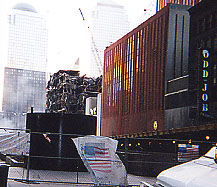
Ground Zero a few weeks later was a combination of tourism, with the finality
of a mass grave, the devastation of a Hiroshima or concentration camp,
mixed with incongrous images of a fallen McWorld. The picture taking is
not always disrespectful: tourists are also mourners, filing slowly and
silently through the labyrinth of rubble, handmade memorials, flags and
soldiers in uniform. 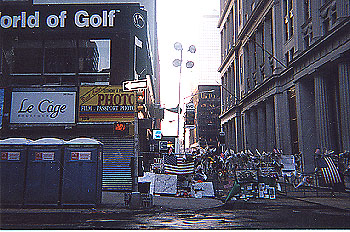
It is a spiritual place, even for atheists and agnostics. It seemed as
if the thousands of people whose bodies were pulverized left their souls
floating around the smoke and rubble, somehow telling us their stories,
giving us hope, praying that the whole human race won't fall to the same
devastation they did.
Ground Zero seemed like the safest place on earth because of the will
to power that has been catharsized and pulverized. So much testosterone
has been released in this place-- the ecstasy of the young hijackers as
they crashed into the towers at 600 mph, achieving their supreme goal,
the desperate fights for life, the toppling of the most powerful buildings
and people. The political, economic and psychological devastation is greater
than anyone would have guessed. So it's a spent area-- quiet, resolute.
It wasn't until we stood on the grids that had been found in the shape
of a cross, that we overcame some of our personal fear. 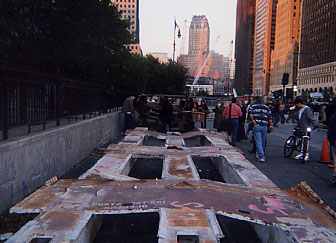 After
being hypnotised by overpowering TV images of death and destruction, I
couldn't believe I was actually standing on those grids that had come
down in the shape of a cross,
After
being hypnotised by overpowering TV images of death and destruction, I
couldn't believe I was actually standing on those grids that had come
down in the shape of a cross, 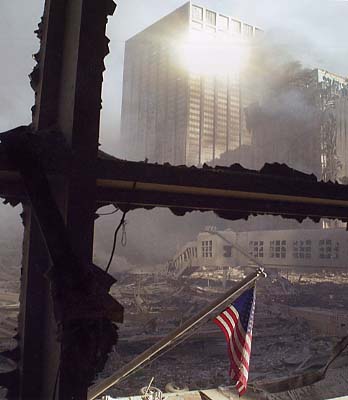 grids
that had survived 600 degrees Fahrenheit and the brutal impact of crashing
jets, grids that had born witness to so much struggle and pain. If only
they could be personified and tell me what happened. But they lay there
silently with the big letters SAVE marked all over them. They will be
part of the memorial, but I prefered them in their raw state, before we
make them pretty to hide our fear of the depth of the destruction that
occurred. I had expected the air to be so bad that I would get sick but
it was really the smell, the smell of carrion I know only too well after
treating many dying patients, mixed with the smell of stale smoke, concrete
dust, and fuel, that kept me awake the day after the attacks when the
winds blew north.
grids
that had survived 600 degrees Fahrenheit and the brutal impact of crashing
jets, grids that had born witness to so much struggle and pain. If only
they could be personified and tell me what happened. But they lay there
silently with the big letters SAVE marked all over them. They will be
part of the memorial, but I prefered them in their raw state, before we
make them pretty to hide our fear of the depth of the destruction that
occurred. I had expected the air to be so bad that I would get sick but
it was really the smell, the smell of carrion I know only too well after
treating many dying patients, mixed with the smell of stale smoke, concrete
dust, and fuel, that kept me awake the day after the attacks when the
winds blew north.
In times of crisis, we are forced to come to terms with death. I have
been forced to come to terms with personal death through rape, attempted
murder, arson and a cancer scare, and the death of parents and close friends,
but until 9/11 I had never really imagined the possible death of my civilisation.
This is a fear older generations experienced after Hiroshima. But now
as a potential World War III escalates, I realize how easy it would be
to destroy the human race. Although I have come to terms with my own mortality
(although I am sure suffering and instinct for survival will make the
surrender difficult), I have not yet come to terms with the extinction
of the human race.
Our walk through the labyrinth of ground zero ended in Battery Park as
the sun set over New Jersey, a ripe round ball of red fire, as clear and
potent as Western sunsets over the Pacific. I lay over the rail looking
at the Statue of Liberty. She seemed a little too small and faraway, but
maybe that is better. If Manhattan blows up, maybe she will survive, a
testimony to a youthful, vibrant, tremendously creative and intelligent
people who loved freedom too much. South Street seaport and the Fulton
fish market were beginning to come back to life with elegant shopping,
delicious dinners, beautiful views, and yes- tourists. Will Ground Zero
become the Yosemite of Manhattan?
The students who lived near the WTC and had to evacuate their homes felt better when they could finally return and own their dust-covered rooms. The ones who just witnessed the event on television felt better when they could own the site, take pictures, stand on those grids and be comforted by the sight of the Statue of Liberty against the setting sun.
INTEGRATIVE
So how does one integrate these horrific events into a traditional academic
syllabus? Terrorism is the most relevant thing of the day as it has taken
over the real and electronic environments. Therefore the syllabus must
respond.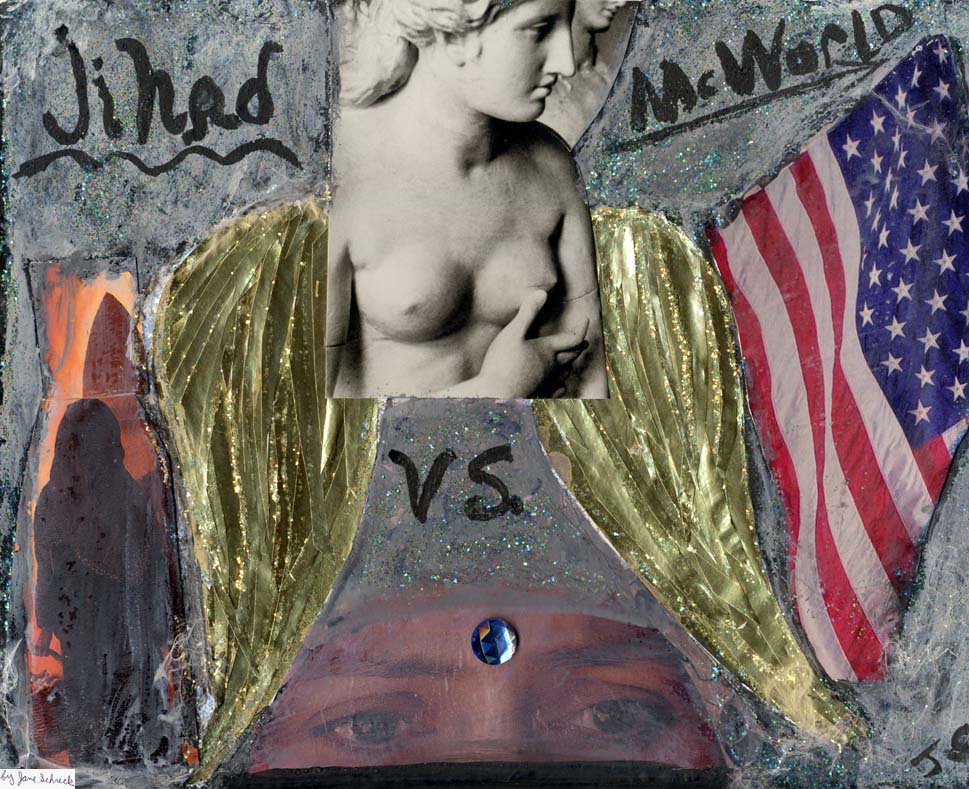 THE OHM
OF MCWORLD
THE OHM
OF MCWORLD
By Jane Schreck
11/9/2001
WHITE NOISE, LOUD TOYS, BEASTIE BOYS, RUMBLING TRAINS, THUNDERING PLANES,
BOOMING CRANES, SCREECHING CARS, CROWDED BARS, ROCKET TO MARS, TICK
TOCKS, DIGITAL CLOCKS, BLASTING ROCKS, ELECTRIC HUMS, PHONE YOUR CHUMS,
VACUUMN UMMS, SUBWAY ROARS, SLAMMING DOORS, SCREAMING WARS, TALKING
HEADS, CREAKING BEDS, HE SAID-SHE SAIDS, SCREAMING ADS, NOISY FADS, AUTO
CADS, THIN WALLS, SHOPPING MALLS, CELL PHONE CALLS, DVDS, MY MTV, SOUPED
UP
PCS, HARD DRIVE BUZZ, STATIC FUZZ, SURROUND SOUNDÖ HISS, SWISH, ZIP,
FIZZ, POP,
BLEEP, CLANG, THUD, CRASH, SNAP, BUZZ, HUM, PING, CRACKLE, RING, BLAST,
RAT-A-TAT-TAT, GONG, CLICK, DIN, MURMER, SCREECH, ROAR, FRACAS, SHRILL,
WHOOP, RATTLE, PEAL, TOLL, THUNDER, BOIL, BUBBLE, SCREAM, BANG,
RUB-A-DUB-DUB, CHORTLE, WHISTLE, BLUSTER, RACKET, SHOUT, SHRILL, ECHO,
BEEP,
HONK, BAWL, GUFFAW, CHURN, CHUG-A-LUG, SCHRIEK, BONG, POOF, GUST, CLAMOR,
RAP, KNOCK, HUBBUB, CLAP, CLATTER, ZING, ROAR, TAP RUMBLE, BLABBER, DING,
TWEET, BELLOW, CRUNCH, SWIZZLE, PANDEMONIUMÖ A DEAFENING, CLAMOROUS,
EARTH SHAKING VOCIFERENCEÖA LOUDMOUTHED UPRORIOUS CACOPHONY
CULMINATING IN THE PERFECT OHM OF MCWORLD.
Jihad vs McWorld was my course theme for fall 2001 at NYU and SUNY, the theme I had chosen BEFORE 9/11. It was the way I would tie together the five courses I teach across four departments of writing, literature, media and communication. Inspired by Benjamin Barber's book Jihad vs McWorld, I had spent the summer collecting a bibliography that explored the Twilight of American Culture with such books as Amusing Ourselves to Death, White Noise, the Great Gatsby and global literature, God Dies by the Nile, Things Fall Apart, The Plague, No Exit. Little did I know how congruent my reading assignments were going to be with world events. The anthrax attacks occurred as we were reading Albert Camus' The Plague and students not only understood French existentialism better than before but were comforted by the way humans ultimately triumphed over the one of its greatest threats. My students have asked whether or not I'm psychic; my family was worried the FBI would call and ask if I knew anything about 9/11. Jihad vs McWorld: Whose Paradise is Lost is a syllabus instantly designed and sensitive to students needs and current events. The objectives and requirements of the course did not change-- only the focus on the specific readings.
One of my students, Sherida Davis-Bryan, wrote this poem/synopsis of the syllabus and how she sees the integration of the books with current events:
McWorld at Full Tilt
There is No Exit
the Plague is upon us.
CNN stands by live,
as God Dies by the Nile.
The Brave New World
becomes a Wasteland
of Black Waters and White Noise,
lacking Sanctuary and Humanity.
Black Waters flow
covering our eyes,
Hiding the symbols,
Golden Arches,
Red, White and Blue,
Just do it, people, just do it.
We live the Joke,
but we take it seriously.
Einstein’s Dreams
could never create this -
A world where fantasy becomes reality.
This Cold New World,
becomes a dim, flickering light
In the Twilight of American Culture.
Talking about A history of God,
which is really the story of man’s eternal struggle.
The Magic Mountain has lost its spunk
We sing and dance, gyrating in a funk.
Imagining we are Angels in America,
Red Azaleas in our hair.
In Our Own Words,
the Collapse of Complex Societies,
are caught on tape, in print and on the web,
shown repeatedly for your viewing pleasure.
The revolution will be televised, streamlined,
cross-edited, mass marketed,
written up and bound in hard cover and paperback
before the first drop of blood dries.
Jihad vs. McWorld,
coming soon to a theater near you.
Another hit in the series
"Amusing Ourselves to Death"
Sit back, relax and enjoy the show.
Orgy porgy begins now.
Sherida Davis-Bryan.
The first week, while the students were reading Einstein's Dreams by Alan Lightman and Jihad vs McWorld by Benjamin Barber, the planes hit the towers on the fatal Tuesday, September 11.IV. CRITICAL
Critical thinking requires some objectivity to analyse claims
and bias, to debate all sides and to develop and refine logical arguments.
After 9/11, the American media were heavily censored. My students wanted
to know the other side, the stories the networks and/or Bush administration
were afraid to tell. Fortunately one of my students, Fareed Tokhi, a Muslim
from Afghanistan, predicted the jubilant liberation of Kandahar and other
events that initially surprised us. He gave us a unique vision of how
Afghans have merged with McWorld in these photos of his family in Afghanistan.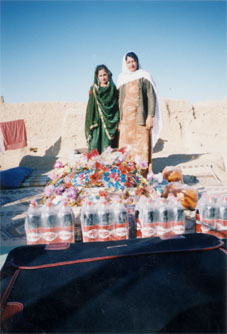
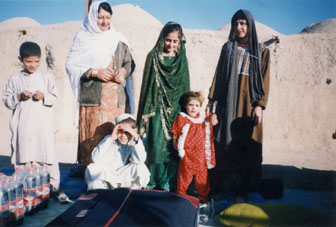
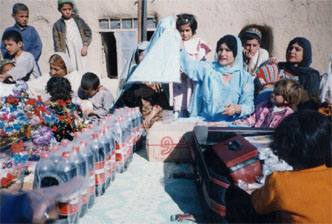 When
a student's emotions are subsumed by devastating world events, it is hard
to hear a voice of reason that is uniquely one's own. I did not discourage
emotional expression; on the contrary, I encouraged it, but developed
role playing and dialectic to engage all points of view. In this diagram,
Jane Schreck brainstorms the first categories that come to her mind about
the Jihad vs McWorld conflict:
When
a student's emotions are subsumed by devastating world events, it is hard
to hear a voice of reason that is uniquely one's own. I did not discourage
emotional expression; on the contrary, I encouraged it, but developed
role playing and dialectic to engage all points of view. In this diagram,
Jane Schreck brainstorms the first categories that come to her mind about
the Jihad vs McWorld conflict:
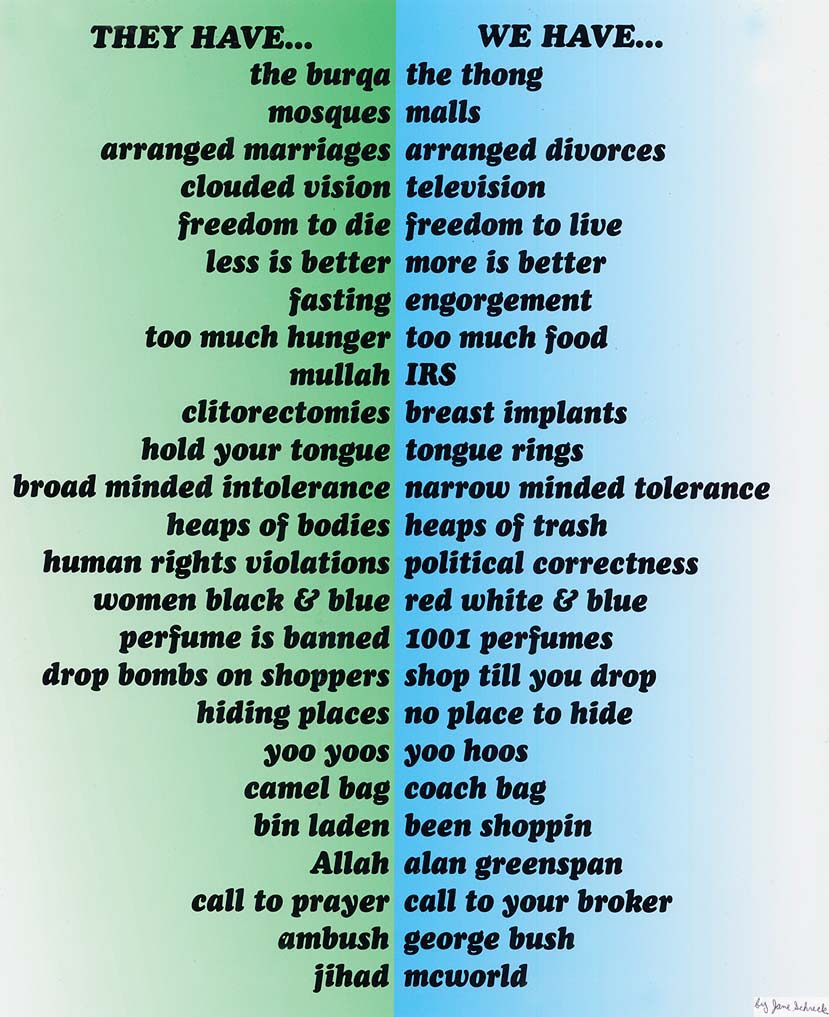
My Afghan student insisted that Muslims like McWorld. After prayers at
the Mosque they eat at Wendy's. All over the world they think our coke
is sweet, although our policies are poisonous. The Taliban stuff their
face with American donuts, spilling the fake chemical cream over those
long beards, even though they abhor our clothing and treatment of women.
When threatened by events like the terrorist attacks on the icons of capitalism,
the World Trade Center, McWorld responds by encouraging its consumers
to shop until they drop with jingles like, "when the going gets tough,
the tough go shopping." We see pictures of people at malls looking
painfully into the camera as they say, "We decided to be strong this
holiday and go shopping. You have to move on." Such recommendations
were first made by Giuliani as he begged the world to keep spending money
in New York to show support. Right after the attacks, McWorld began its
campaign to continue selling. Starbucks closed for two days but resumed
its business as successfully as before. McWorld then decorated itself
with American flags to enhance American hegemony on world markets and
create more sympathy for Americans. It worked. Self expression, individuality
and creativity were put on hold as the group feel, group think were reinforced
and sentimentalized.
What McWorld has done for years to prevent internal combustion through
inequality is to make sure that its creativity stage produces a mass market
rather than an elitist aristocracy, so that its cheap, often life-debasing
products are accessible to everyone. Although there is tremendous waste
in the upper levels of McWorld, some decadence is curbed by corporate
workaholism and the health movement which channels testosterone and prevents
citizens from becoming too soft and lazy. Special op forces trained, in
part, the way adventure travellers do, winter camping and trekking in
the mountains of Colorado and upstate New York. McWorld shies away from
the European leisured classes who lost their energy and grit.
McWorld controls the critical stage by treating its humanities professors,
the bastion of critical culture, like intellectual factory workers of
the nineteenth century. Especially in the large American cities, some
of the best intellects are paid no more than babysitters and given no
sociopolitical power. In a democracy they have free speech but in a global
capitalist society, if they lack monetary means, they are rendered somewhat
impotent.
Because of its conscious and unconscious organization, McWorld has had
a successful run for many years because its creativity never becomes elitist,
it appears to offer its poisons to everyone, and it keeps its critics,
such as professors, artists and intellectuals, fiscally impotent. It also
has enough mindless amusement to channel frustration and an incentives
package to allow some hierarchy in the splendors of its consumerism.
In the clash between Jihad and McWorld students exposed my bias, the bias of an underpaid, elitist Western intellectual. Rejecting this binary thinking, Philip Simon did research on a new American syncretism. His abstract is as follows:
Nursing History's Clipped Branches in A New American Syncretism by Philip Simon
Our species’ memory threads through the fabric of modernity in a pattern no longer recognized for all its sublimity, terrifyingly sublime as traditions may sometimes be, yet Islam’s politicized tribalism itself offers a unique and adaptive vision of cognitive coherence in the model of the gnostic Ismaili sect. Can ascetic faith possibly combine with cosmopolitanism, schemes of social justice hand-in-glove with sophisticated economic exchange? Indeed the nature of both faith and material economy incline the contemporary observer and the popular mind to estimate and define the former by its fundamentals and the latter by its practical effects. All meaningful change takes place at the fundament of a system, though, and in such months as these since September 11th, 2001, when religious faith’s fundamentals tend to be inductively associated with unilateral, isolated terror, and the politics of economy are called ever greater to account for discrepancies, for hypocrisy and mechanistic shortsightedness, an exploration of the material effects of spiritual belief countermand the non sequitur polarity with which the notion of absolute truth charges competing religious claims, and the social Darwinism by which one notion tends to subsume the Other. McWorld would swallow Jihad would swallow McWorld like Counts Ugolino feeding on the heads of each infernal neighbor for all eternity: the death of intellectual curiosity and spiritual courage are the death of enlightened citizenship, but the syncretic ideal upon which capitalist democracy was constitutionalized defines itself by the incorporation of effectively synergistic systems. In search of the Kantian meta-Rational noumenon, the Imam’s cognitive flexibility is a movement toward personal order within complex societies’ eternally-recurrent entropy.
V. CREATIVE
When all information is filtered through McNews' homogeneous channels, it is hard to be original enough to come up with something creative. In spite of its advantages, the Internet is a minefield for plagiarism and recombinant thought. As soon as we get an original idea, all we have to do is type it into a URL and someone else's website with similar gems appears before our unconscious can ravel its ureka. In the past we could at least think we were original because we weren't sure what other civilizations were doing or had done. In the midst of terrorism and wars to counter terror, there is even less originality as normally creative, critical citizens are converted into true believers, swayed by the momentum of a life or spirit saving movement. What can a professor do to counteract the strong forces of conformity that wedge a terrified society into both real and imaginary constructs of safety? The first task is to nurture a sense of self through personal writing, hence the journals. Then to encourage a sense of play, an ability to take chances and risks safely, to let go of the chains of reality or at least manipulate them, to allow oneself the luxury of being wrong. While the students can play the roles of world leaders, they are fortunately still free to be themselves.The best antidote to the indoctrination that creates the true believers of terrorism is an educational process that enhances, encourages and develops self-expression, that provides a safe space for non-conforming individualists, and does not succumb to the censoring progaganda often necessary to wage war.
The homospatial imagery and Janusian thinking so often an essential part
of creativity are painful experiences themselves, without the added trauma
of terrorism. It's hard to capture and catharsize nightmares into art.
So sometimes terrorism paralyses creativity. It is the job of the professor
to create a safe, playful environment where students can explore the agony
and ecstasy of their unconscious and take chances with its expression.
I am so proud of all the students I have taught over the years, especially Jane Schreck and the many students whose work is featured in these online journals. Sometimes creativity leads to an even stronger expression of patriotism,
as evidenced by this collage by Sherida Bryan-Davis.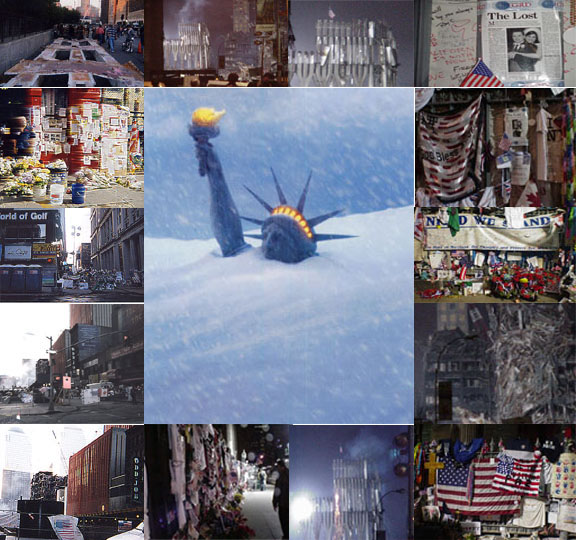
III. CATHARTIC
Aristotle first defined cathartic as the orgasmic release of emotion that brings a sense of finality and relief, a necessary part of the crisis/climax/resolution of drama. One can speculate that Mohammed Atta and other hijackers felt the catharsis of their faith, fear and fury as they crashed into the towers. My students were left impotent, frustrated, frightened and confused by their actions, and then paralysed by the sweeping mass movement that followed to create enough American unity and patriotism to wage a war. First I encouraged personal expression in the emails, then journals and diaries with photos, then long, heated discussions and debates in class and on the listserv, some lecture demos like Jane Schreck's presentation on Middle Eastern dance where the students dressed up in the beautiful costumes she had gathered in her career as belly dancer, then finally a film,
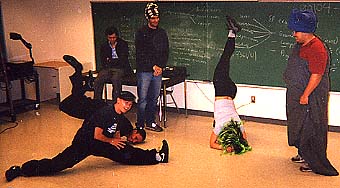 OSAMA
COMES TO NEW PALTZ where students upstate metaphorically killed Osama in
Tora Bora with Afghan Break Dance.
OSAMA
COMES TO NEW PALTZ where students upstate metaphorically killed Osama in
Tora Bora with Afghan Break Dance.  Students in a Public Speaking class at SUNY New Paltz chose various leaders
to play such as Tony Blair, Guiliani, Colin Powell, Osama, a Suicide Bomber,
Maureen Dowd, George Carlin and the President of MTV.
Students in a Public Speaking class at SUNY New Paltz chose various leaders
to play such as Tony Blair, Guiliani, Colin Powell, Osama, a Suicide Bomber,
Maureen Dowd, George Carlin and the President of MTV.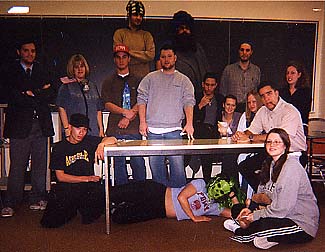 Mock UN debates, mock criminal trials of John Walker Lindh,
Mock UN debates, mock criminal trials of John Walker Lindh, 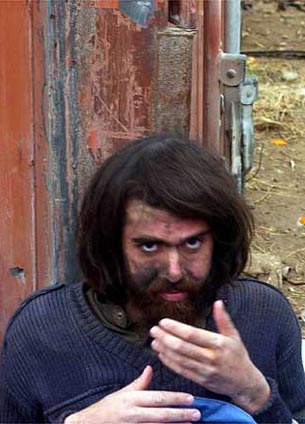 and
Zacarias Moussaoui, mock presidential and mayoral campaigns were organized
for a SUNY argumentation class. In the Literature we acted out Jean Paul
Sartre's No Exit as America began bombing Afghanistan. Deborah Drucker
after 9/11 just wanted to see stand-up comedy so I suggested she write a
research paper on
Comic Perspectives on Terrorism. Sometimes the only thing we can do
with pain is laugh at it.
and
Zacarias Moussaoui, mock presidential and mayoral campaigns were organized
for a SUNY argumentation class. In the Literature we acted out Jean Paul
Sartre's No Exit as America began bombing Afghanistan. Deborah Drucker
after 9/11 just wanted to see stand-up comedy so I suggested she write a
research paper on
Comic Perspectives on Terrorism. Sometimes the only thing we can do
with pain is laugh at it.
IV. COMPASSIONATE:
To this list of responsive, integrative, critical, creative and cathartic, I must add the word compassionate so that in the imaginative concoction of utopian schemes and the cathartic fun of role playing, we do not lose sight of the ultimate morality of our actions or the empathy for people of different cultures and beliefs. Otherwise we let students stop after they have knocked down the bricks that built the castle in the human joy of nihilism; we allow them to define themselves ultimately as terrorists who worship the God of Death more than Allah, Christian, Jewish, Buddhist and Hindu Gods, the God of Technology, Science or Money, Communism, Socialism or any other transcendental construction. Humans do well to try to transcend themselves but only with a sense of humor and humility and a tolerance for the imperfection of their fantasies. Only pure nihilism is perfect, because it is absolute. If al Qaeda could achieve its goals of turning the Western world into an apocalyptic wasteland, wrecking environmental destruction on the entire earth, what would be their plan of action? Would everyone live in this arid moonscape under a Taliban-style rule, where yearnings for change would be met with amputations, beheadings and stonings? The psychology of terrorists is that they are perenially discontent, always moving on, knocking down, destroying until they meet the God -- of death.
But Americans also have more subtle ways of destroying the globe with consumer-driven environmental policies, excessive development to the detriment of nature, unilateral political policies that ignore the will and ways of important countries, and a corporate hegemony that lets its waste grow like cancer. This is not to undermine the generous, protective spirit of Americans and the vital role they play to nurture and foster liberty and human rights. But there is a dialectic to everything and no one is immune from self criticism in the interests of global harmony.
After the play acting, self expression, vitriolic dialectic, and academic
discourse, we, as humans, have the responsibility of creating a global
community that is safe, peaceful, productive-- a home for the human race,
ever in danger of extinction when its hubris or violence outweighs its
capacity for reason and tolerance. None of my students ever lost sight
of this mission, of this need for a way to ensure continuity and avoid
apocalypse, not only of different human civilisations but of the environment
and health of the ecosphere.
As we struggle for peace and harmony in the global world in 2002, terrorism, defined as war by some, becomes the pervasive obstacle. Osama bin Laden categorizes Bush and Blair as bad terrorists, and al Qaeda as good terrorists.Bush sees binary clashes between freedom-lovers and evil doers, although these boundaries may be rather murky in practice. The Israelis call Yasser Arafat a terrorist but the Palestinians claim the Israelis, as oppressive occupiers, are the greatest terrorists of all. The CIA nurtured both Osama and Saddam Hussein as freedom fighters when U.S.foreign policy goals were different. One man's freedom fighter is the other's terrorist. Yet with the increasing threat of weapons of mass destruction, we must work a little harder to get along.While globalism can be suffocating if it becomes another empire fashioned after Rome, care, concern and communication among all beings are worthy goals if the human race is to survive. The internet can still embrace a global community in spite of corporate hegemony, university lockdowns, cyberterrorist cells, hackers heavens and pornography. Love it or hate, it is a microcosm of a world. Let's use it productively to create a more harmonious world community.